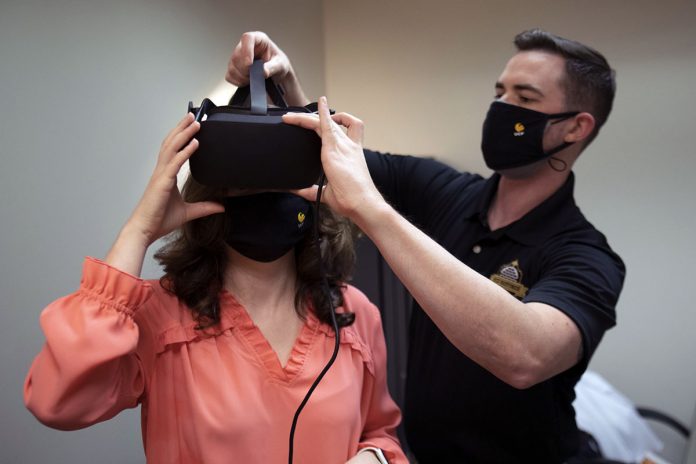The American Psychiatric Association estimates that one in 11 people will be diagnosed with posttraumatic stress disorder (PTSD) in their lifetime, but new virtual reality (VR) technology is providing hope for the recovery of those suffering.
UCF RESTORES, a nonprofit trauma research center and treatment clinic at UCF, has developed a state-of-the-art VR treatment tool that can be used to dynamically recreate each patient’s traumatic experience — an innovation that is now entering the clinical trial phase.
The tool will immerse participants in the sights, smells and sounds of their original trauma, all of which can be customized to the participants’ unique experience. Recreating the exact sensory stimuli that occurred in the context of the traumatic event is crucial to effective recovery. By re-introducing these sensory elements that now serve as “triggers” of fear and panic while undergoing therapy, the patient learns to no longer react fearfully or avoid the sights, sounds and places that used to generate their fear and are able to recover from PTSD.
The VR tool will be integral to the evidence-based approach of exposure therapy, which UCF RESTORES leverages as a key component of its successful treatment program. Through exposure therapy, clinicians can guide patients to face very specific elements of their traumatic memory, using customized stimuli, and help create a new physiological response.
Until now, the center’s use of VR has relied upon a third-party system with limited customization of its visual elements for non-combat-related trauma. The new, proprietary VR tool will be used to test the efficacy of UCF RESTORES’ exposure therapy treatment in a further condensed, two-week intensive format as the center launches clinical trials for those suffering from adult-onset PTSD.
Individuals 18 years of age and older in the U.S. who meet the diagnostic criteria for PTSD are eligible to participate in this study. The treatment program — including a pre-treatment evaluation, two weeks of treatment and post-treatment assessments — is available at no cost, and hotel accommodations will be provided during the two-week treatment, as needed.
Since 2011, UCF RESTORES has worked to change the way PTSD is understood, diagnosed and treated. The organization’s unique approach to treatment — combining exposure therapy, emerging technology, as well as individual and group therapy sessions — has resulted in 66% of participants with combat-related trauma and 76% of first responders no longer meeting the diagnostic criteria for PTSD following three weeks of intensive treatment.
The U.S. Department of Defense recognized the high success rate of UCF RESTORES’ treatment and, in 2018, awarded the center $3 million to develop this enhanced VR tool to address a wider range of traumatic events that could result in PTSD. Following clinical trials, the goal is to make this cost-efficient system available to trained mental health clinicians across the nation.
“With this tool in hand, we will be able to dynamically recreate scenarios that are customized to each patient’s unique experience, ultimately helping them process traumatic memories, put them in their place and regain control of their daily lives,” says UCF RESTORES Executive Director Deborah Beidel, who is also a UCF Trustee Chair and Pegasus Professor of psychology and medical education. “And we couldn’t have done so without the incredible work of our students and faculty, right here at UCF. They have played a crucial role in developing the host of diverse scenarios used within the VR system, an irreplaceable part of the tool and a great factor in its potential success for treatment.”
When asked about the promise this treatment tool holds for PTSD treatment, Beidel elaborated: “We’re not only changing the way PTSD is treated and processed within the brain. We’re contributing to the larger conversation for continued need of innovative and effective PTSD treatment, advocating for and restoring hope to those who may see no real way out of their current situation.”








